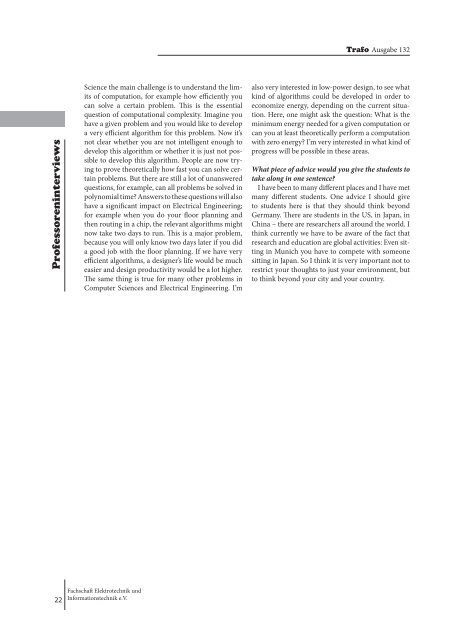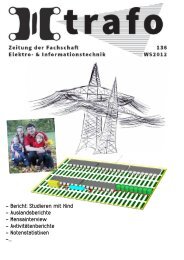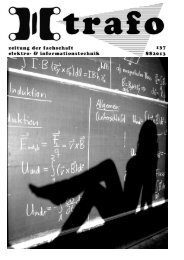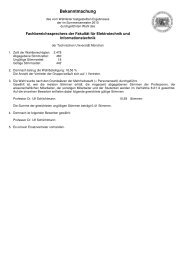Trafo #132 - Fachschaft Elektrotechnik und Informationstechnik - TUM
Trafo #132 - Fachschaft Elektrotechnik und Informationstechnik - TUM
Trafo #132 - Fachschaft Elektrotechnik und Informationstechnik - TUM
Erfolgreiche ePaper selbst erstellen
Machen Sie aus Ihren PDF Publikationen ein blätterbares Flipbook mit unserer einzigartigen Google optimierten e-Paper Software.
Professoreninterviews<br />
22<br />
Science the main challenge is to <strong>und</strong>erstand the limits<br />
of computation, for example how efficiently you<br />
can solve a certain problem. This is the essential<br />
question of computational complexity. Imagine you<br />
have a given problem and you would like to develop<br />
a very efficient algorithm for this problem. Now it’s<br />
not clear whether you are not intelligent enough to<br />
develop this algorithm or whether it is just not possible<br />
to develop this algorithm. People are now trying<br />
to prove theoretically how fast you can solve certain<br />
problems. But there are still a lot of unanswered<br />
questions, for example, can all problems be solved in<br />
polynomial time? Answers to these questions will also<br />
have a significant impact on Electrical Engineering;<br />
for example when you do your floor planning and<br />
then routing in a chip, the relevant algorithms might<br />
now take two days to run. This is a major problem,<br />
because you will only know two days later if you did<br />
a good job with the floor planning. If we have very<br />
efficient algorithms, a designer’s life would be much<br />
easier and design productivity would be a lot higher.<br />
The same thing is true for many other problems in<br />
Computer Sciences and Electrical Engineering. I’m<br />
<strong>Fachschaft</strong> <strong>Elektrotechnik</strong> <strong>und</strong><br />
<strong>Informationstechnik</strong> e.V.<br />
<strong>Trafo</strong> Ausgabe 132<br />
also very interested in low-power design, to see what<br />
kind of algorithms could be developed in order to<br />
economize energy, depending on the current situation.<br />
Here, one might ask the question: What is the<br />
minimum energy needed for a given computation or<br />
can you at least theoretically perform a computation<br />
with zero energy? I’m very interested in what kind of<br />
progress will be possible in these areas.<br />
What piece of advice would you give the students to<br />
take along in one sentence?<br />
I have been to many different places and I have met<br />
many different students. One advice I should give<br />
to students here is that they should think beyond<br />
Germany. There are students in the US, in Japan, in<br />
China – there are researchers all aro<strong>und</strong> the world. I<br />
think currently we have to be aware of the fact that<br />
research and education are global activities: Even sitting<br />
in Munich you have to compete with someone<br />
sitting in Japan. So I think it is very important not to<br />
restrict your thoughts to just your environment, but<br />
to think beyond your city and your country.





